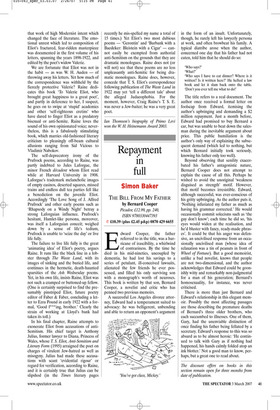Repayment in full
Simon Baker
THE BILL FROM MY FATHER by Bernard Cooper Picador, £12.99, pp. 240, ISBN 9780330447393 ✆ £10.39 (plus £2.45 p&p) 0870 429 6655 Edward Cooper, the father referred to in the title, was a hurricane of irascibility, a whirlwind of contrariness. By the time he died in his mid-nineties, uncoupled by dementia, he had lost his savings to a series of petulant, ill-conceived lawsuits, alienated the few friends he ever possessed, and filled his only surviving son with a monograph’s worth of neuroses. This book is written by that son, Bernard Cooper, a novelist and critic who has penned two previous memoirs.
A successful Los Angeles divorce attorney, Edward had a temperament suited to advocacy: he was belligerent, unbending and able to return an opponent’s argument in the form of an insult. Unfortunately, though, he rarely left his lawyerly persona at work, and often browbeat his family. A typical diatribe arose when the author, concerned one day that his father had not eaten, told him that he should do so:
‘Who says?’ ‘What?’ ‘Who says I have to eat dinner? Where is it written? Is it written here?’ He hefted a law book and let it slam back onto the table. ‘Don’t you ever tell me what to do!’
The title refers to a real document. The author once received a formal letter on foolscap from Edward, itemising the author’s upbringing and demanding a $2 million repayment. Just a month before, Edward had promised to buy Bernard a car, but was unable to beat down the salesman during the inevitable argument about price. This public humiliation is the author’s only way of explaining the subsequent demand (which led to nothing, but which Bernard initially took seriously, knowing his father only too well).
Beyond observing that senility exacerbated his father’s antagonistic nature, Bernard Cooper does not attempt to explain the cause of all this. Perhaps he wished to avoid the unoriginal ‘weakness disguised as strength’ motif. However, that motif becomes irresistible. Edward, although successful, was ever-conscious of his gritty upbringing. As the author puts it, ‘Nothing infuriated my father as much as having his grammar corrected.’ He would occasionally commit solecisms such as ‘the guy don’t know’; each time he did so, ‘his eyes would widen at the realisation, and he’d bluster with fancy, ready-made phrases’. It could be that his anger was defensive, an uncivilised response from an occasionally uncivilised man (whose idea of relaxation was a tin of peanuts in front of Wheel of Fortune). But a good memoirist, unlike a bad novelist, knows that people are not two-dimensional, and the author acknowledges that Edward could be goonishly witty and remarkably non-judgmental for a man of his generation; Bernard’s homosexuality, for instance, was never criticised.
There is more than just Bernard and Edward’s relationship in this elegant memoir. Possibly the most affecting passages are those describing the premature deaths of Bernard’s three older brothers, who each succumbed to illnesses. One of them, Gary, had the unenviable distinction of once finding his father being fellated by a secretary. Edward’s response to this was so absurd as to be almost heroic: ‘He continued to talk with Gary as if nothing had happened, his hands calmly folded atop an ink blotter.’ Not a good man to know, perhaps, but a great one to read about.
The discount offers on books in this section remain open for three months from date of publication.










































































 Previous page
Previous page